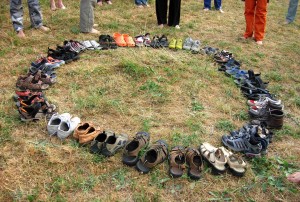Frustrated with the world of politics today? Unless you are reading this from your hospital bed, having just awakened from a long coma, I am going to guess the answer is yes. Whether you are a Democrat or a Republican, it’s likely that you have about had it with all of the acrimony and with the arguments being made by “the other side”. Probably the one thing we can all agree on is that everyone on “the other side” is quite disagreeable, both in their opinions and their manner of expressing their views.
If you have bravely ventured out into the world of political discourse in an attempt to influence “the other side”, whether at a gathering of friends or family, or on some social media site, there is a pretty good chance you came away even more frustrated after the experience. Any naïve thoughts you may have had about the other person changing their mind likely hit a brick wall that, by the end of the exchange, had become, if anything, even stronger in its resistance. If “the other side” argued back at you there is a pretty good chance that your brick wall got fortified as well. You and “the other side” achieved the very opposite of what you both wanted to achieve, and you both were left in a state of frustration.
As a divorce lawyer, I am struck by how similar all of this is to how most couples behave when they are in conflict. I am hoping there is something about watching these political arguments that may create a true learning opportunity for these couples. The reality that I just described; the dynamic that most arguments lead to chaos, frustration, and a deepening of divisions is an important insight. And what better time to learn it than when you are going through a divorce.
Trust me, as someone who has “been through” numerous divorces, the maddening events that are playing out on the political stage, bear an amazing resemblance to conversations I have regularly observed in my office during the past three decades. Two people, seized with emotions, bent on getting another person to agree with them, stay awake at night thinking of great arguments to persuade their spouse that they are right, or worse, thinking of “good” attorneys who can do that for them.
If you are in the middle of it (either politics or divorce), you are likely so caught up in your frustration with “the other side” that you have little insight about what you are doing that is actually making your life worse. However, if you are able to stand back, if only for a moment, both with the political arena and arguments with divorcing couple, it is fairly easy to see that all we are doing is pouring gas on a raging fire. Once you come to that realization, you may find yourself wondering what the alternative might be. Our inner voice immediately retorts that “we can’t just give in”, thinking, from the standpoint of our ego, that fight or flight are the only true options. Is there a third option?
There is. It has different names, but the most common phrase that negotiators use is “interest-based bargaining.” I will skip that jargon and simply call this alternative “dialogue” for the moment. Dialogue, in the sense I am using it, is one of those ideas that is simple but not easy. It starts with the idea of letting go of arguments and changing minds and focusing instead on seeking common ground or at least a basis for common understanding. What I have observed, at least with divorcing couples, is that if we can reframe the discussion away from “arguments to change minds” and on to dialogues aimed at achieving common understanding, it is possible to achieve common goals. This type of dialogue is a central tenet of something called Collaborative Divorce. To learn more about Collaborative Divorce, go to www.collaborativelaw.org. In the meantime, watch what is happening on the political stage and see if there might be some valuable life lessons that will help us become a better nation, and better families.
About the Author Ron Ousky, JD, is a Collaborative Attorney and mediator who has dedicated his practice to making sure that families facing conflict understand their options. He believes that families facing divorce are in a unique situation to make a better life for their families and he is dedicated to helping them find the resources to build a better future. For more information about his practice go to www.ousky.com
Ron Ousky, JD, is a Collaborative Attorney and mediator who has dedicated his practice to making sure that families facing conflict understand their options. He believes that families facing divorce are in a unique situation to make a better life for their families and he is dedicated to helping them find the resources to build a better future. For more information about his practice go to www.ousky.com











